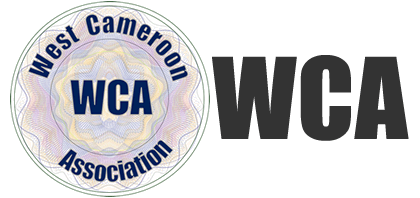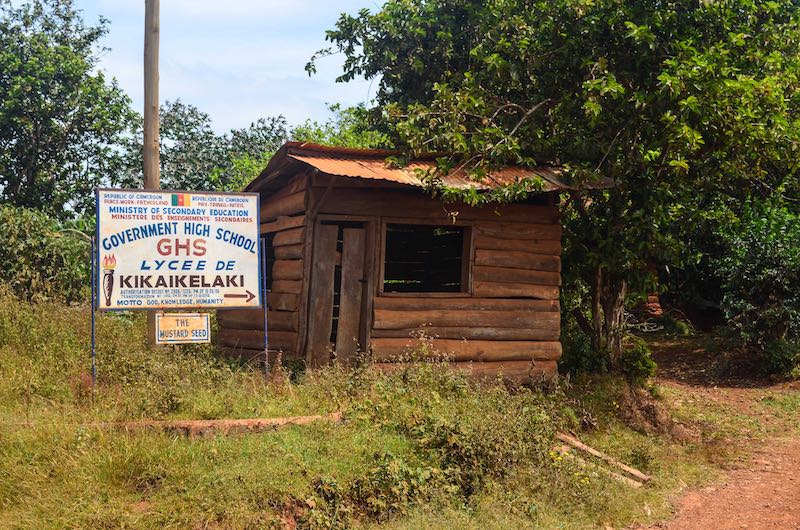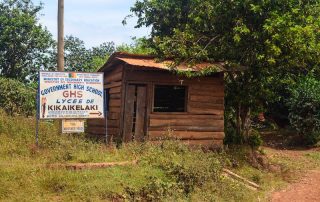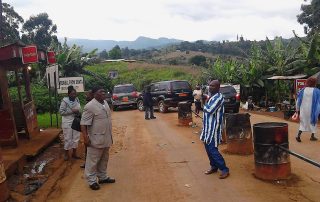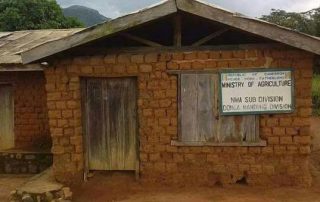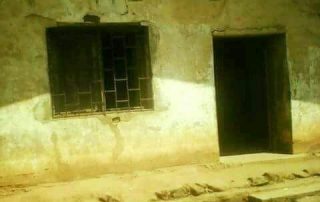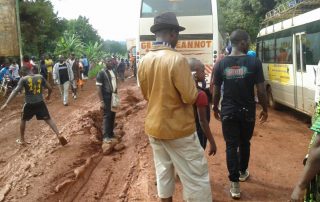The Southern Cameroon State (now renamed West Cameroon) came into a two-state federation with La Republic Du Cameroun (LRC) also referred to as East Cameroon in 1961. The constitution of 1961 safeguarded the minority status of English-speaking Cameroonians in West Cameroon in this federation of two states equal in status. Before the re-unification the then Southern Cameroons had a thriving economy, which had been set up and supported by the United Kingdom government under indirect rule of the territory since 1919.
Sadly, instead of maintaining co-existing development of the infrastructure of the two states LRC engaged in a campaign, firstly under the leadership of president Ahmadou Ahidjo and then followed by president Paul Biya to undermine and close down many of the industrial and economic infrastructure that provided economic growth and employment opportunities in West Cameroon. In addition, over the years there is now a clear pattern of new economic projects being created and concentrated in LRC leading to a massive gulf in economic activity between West Cameroon and LRC.
This situation has become so acute that the people of West Cameroon have become wholly economically dependent on East Cameroon (LRC). The prosperity and wellbeing of people of West Cameroon have been adversely affected by the disappearance of these economic assets in their territory, and who are seeking to get jobs mainly in the LRC with great difficulty as French is the language of business. The situation has been made worse with Cameroon’s system of state nepotism where all essential management roles within the Civil Service, the largest employer in Cameroon, are based on appointments from the Presidency. This system disproportionally discriminates against the people of West Cameroon even in roles from their own region. The impact of this economic disenfranchisement has led to a mass exodus of English-speaking West Cameroonians to other countries such as the USA and UK.
The list below is non-exhaustive and represents some key examples of the economic assets which have been undermined by the LRC.
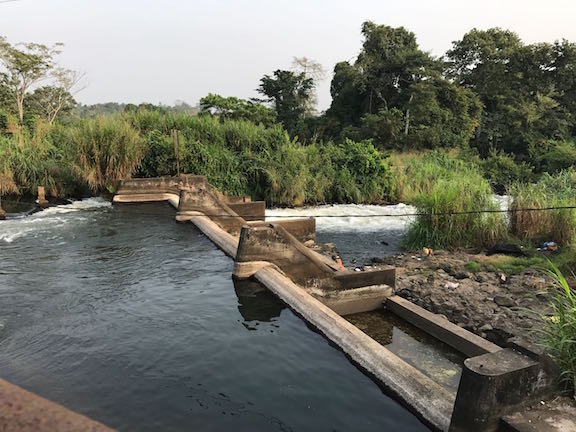
• Airports -Tiko, Mamfe, Bali, Bamenda – These were functioning in the period of federation and prior, and now are all closed down and activity moved to Douala in LRC.
• Seaports – Limbe and Tiko – These were previously functioning and now fully closed. Limbe and Tiko Seaports was used heavily during the British Southern Cameroons times and are natural deep seaports, a gateway to Europe and America. The Cameroon government infrastructure decisions have favoured Douala which is not a natural deep seaport and Kribi seaport in LRC over Limbe and Tiko in West Cameroon. The Kribi seaport is a huge capital investment project which will transform the industrial and economic activity of Kribi in LRC.
• Railway lines – Kumba, Tiko and Buea/Limbe. These were operational even as far back as the German times in Cameroon in line with the economic activity and growth. The undermining of the economy in West Cameroon as also meant that the railways have been confined to the history books.
• Roads – The state of the roads are generally very poor since 1961 with medium scale ad hoc development. Key roads linking up Buea, Kumba, Mamfe, Bamenda and Eastern Nigeria are now completely in a state of disrepair.
SW networks – Fako (Buea), Meme (Kumba), Kupe Maninkuba (Bangem), Ndian (Mundemba), Manyu (Mamfe), Lebialem (Menji) divisions)
NW networks – Mezam (Bamenda), Momo (Mbengwi), Boyo (Fundong), Bui (Kumbo), Ngo-Ketunjia (Ndop), Donga-Mantung (Nkambe), Menchum (Wum)
Intercity networks – Tiko, Mutengene, Victoria, Idenau, Dibuncha
Mutengene, Buea, Muyuka, Kumba, Ekondo Titi
Kumba, Mamfe, Lebialem
Mamfe, Ekok,
Mamfe, Bali, Bamenda
Bamenda, Bambili, Ndop, Kumbo, Nkambe, Bamenda, Mbengwi, Wum, Fundong, Bafut
• West Cameroon Electricity Corporation (POWERCAM) which operated Yoke Dam was managed following international standard and supplied Electricity to all of West Cameroon. It pride itself with good governance and efficiency of delivery. This company was closed down and the provision of Electricity was taken over by SONEL which is a French Company from LRC.
POWERCAM is now defunct but its memory lives on as one of the pillars of economic growth and energy self-reliance in West Cameroon.
• Menchum Falls is situated in the Northwest and is a truly impressive waterfalls. There has been talk from the Cameroonian government to develop Hydroelectric dam at Menchum since from the 1960s but to date no such investment has occurred.
• Oil & Gas – Ndian, Bakassi – developed mainly to service SONARA, although this asset is in Limbe taxes are paid in Douala.
All of Cameroon’s large scale strategic Hydroelectric power projects do not include any that is located in West Cameroon. The full list is provided here;
1) Grand Eweng – Location LRC – Planned Investment
2) Chollet Hydropower – Location LRC – Agreement signed
3) Nachtigal Amont Hydroelectric – LRC – Planned Invested with EDF and IFC
4) Song Loulou Power station – Location LRC – Fully operational since 1981
5) Mouséré (Mbakaou) Hydropower – Location LRC – Planned
6) Edea Power Station – Location LRC – Fully Operational since 1953
7) Memve’ele Power Station – Location LRC – Under construction (phase 1 done)
8) Lagdo Power Station – Location LRC – Operational since 1982
9) Lom Pangar Hydroelectric – Location LRC – Under construction with about $USD0.5bn investment tipped to be one of the largest in Sub Sahara Africa
10) Mekin Power Station – Location LRC – Completed 2016
After over 55 years of re-unification, it cannot be just pure coincidence that all these large scale Hydroelectric energy projects are situation in LRC leading to a strong suspicion and accusation that the Cameroon government has no interest in pursuing a balanced economic development for both West Cameroon and LRC.
CAMEROON BANK: closed down
This was an Anglophone Bank located in Buea. It was the biggest bank in Cameroon and operated under Barclays Bank UK standard in West Africa. It was transferred to Yaounde by Ahmadou Ahidjo and then it finally closed down.
NATIONAL PRODUCE MARKETING BOARD: closed down
It processed and graded cash crop produce like cocoa and coffee in Anglophone Cameroon. The head office was located in Limbe. It informed farmers of the grade of cocoa or coffee before shipping the produce to the world market. It was a striving organisation, financially healthy and a sponsor of football teams in Anglophone Cameroon like Kamac Kumba FC and Kamac Bamenda FC. It was closed down by LRC exposing farmer to exploitation by middle men who now dealt with the farmers.
COOPERATIVE SOCIETIES: closed down
This was a Dutch culture implanted in Anglophone Cameroon. Farmers joined up in cooperative groups for easy management, reforms and funding. Closed down by LRC.
MOBILE POLICE WING: closed down
This was a British trained police forces for Anglophone Cameroon, which was disbanded by Ahmadou Ahidjo and replaced with the French Gendarmes to consolidate his military powers over West Cameroon.
CAT (CAMEROON AIR TRANSPORT): closed down
Main hub was Tiko airport. Transporting CDC produce and also running domestic flights. Was an airline representing Anglophones. Fastest growing airline in West Africa at that time. Closed down by LRC.
PWD: (THE PUBLIC WORKS DEPARTMENT): closed down
Public works department was an Anglophone heavy duty machines company used by councils for road maintenance and repairs. Closed by LRC.
MEDINO: closed down
Trained Agricultural experts to help farmers in educating them on farming methods. HEAD office in Bamenda. Closed by LRC.
EKONA RESEARCH CENTRE:
This is located in West Cameroon. It is still retained but run down with mostly Francophone employees. Was created by Americans, the best research centre in West Africa, and now it is barely operational.
TIKO INTERNATIONAL AIRPORT: closed down
Was fastest growing airport in West Africa. Hosted the Late Dr Nkwame Nkrumah of Ghana during his maiden official visit to British Southern Cameroons. Closed by LRC.
TIKO WHARF:
Still retained with very low operations but with dilapidated infrastructure.
Linked water transport between West Cameroon and Nigeria. Closed by LRC.
FONADE: closed down
This was a special bank in Anglophone Cameroon. Created to subsidise the financing of farmers. Was transferred it to Yaounde by Ahmadou Ahidjo and the name changed to Credit Agricole before closing down.
OMBE TRADE CENTRE:
This is still retained with average and dilapidated infrastructure.
Was a higher institute for technical education during the times of Southern Cameroons with well trained staff and many high value machinery. Ahmadou Ahidjo later downgraded the status of OMBE created new centres in LRC, and the staff and machines were moved to LRC.
SANTA COFFEE
This was mismanaged and closed down by LRC
CAMCCUL (Cameroon Cooperative Credit Union League) – failed with attempted transfer to Yaoundé
CDC (CAMEROON DEVELOPMENT CORPORATION)
This is second largest employer in West Cameroon now under serious threat of liquidation.
CDC was set up by the UK government with large investment during the times of Southern Cameroons. Today its plantations are being privatised and sold off by the government and the corporation has been mismanaged, with plans to move its head quarter to LRC thus following in the footsteps of other failing corporations. It had a great tradition of looking after the welfare of its labourer workers who mainly work in the plantations and live in settlements nearby. Privatisation threatens to destroy the jobs and livelihood of these labourer works who are mainly people from West Cameroon.
SONARA:
Located in Limbe, West Cameroon is believed to be a major revenue generating asset for the government and shareholders. All taxes and revenues are managed from Douala and Yaounde Pipeline is constructed to channel oil resources directly to Douala and Kribi in the Francophone controlled zone. Since the creation of this oil refinery in 1981 the local area and inhabitants have not benefited from this source of significant wealth and the local area has remained very under developed. The staff at SONARA are mainly francophone from LRC and there has never been and Anglophone General Manager.
EMPIRE DAY
CAMDEV
CONFIDENCE HOTEL ORCHESTRA
BALI MODERN JAZZ
LIDO ORCHESTRA
CHRYSTAL GARDEN ORCHESTRA
MOUNTAIN HOTEL ORCHESTRA
WEST CAMEROON HOTELS LTD.

